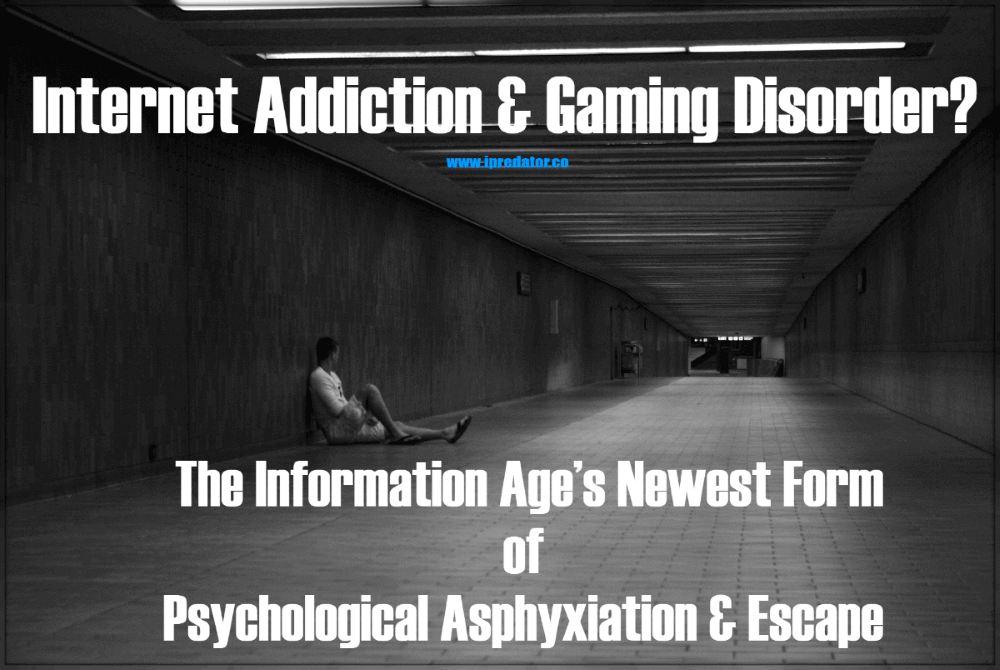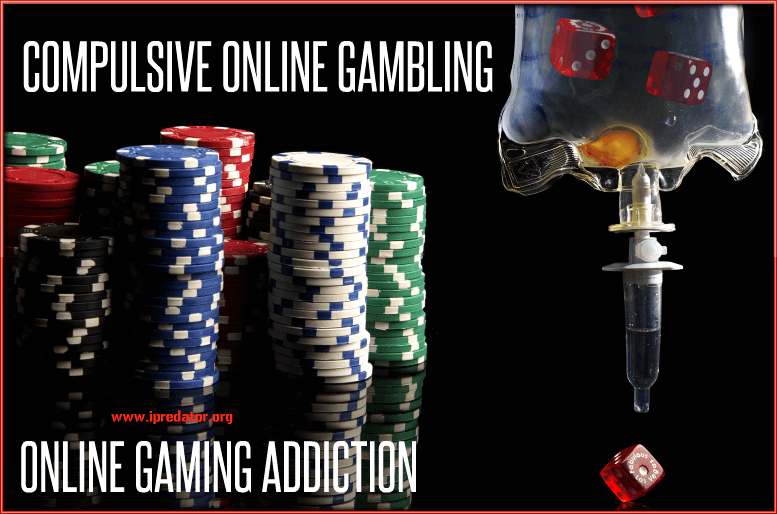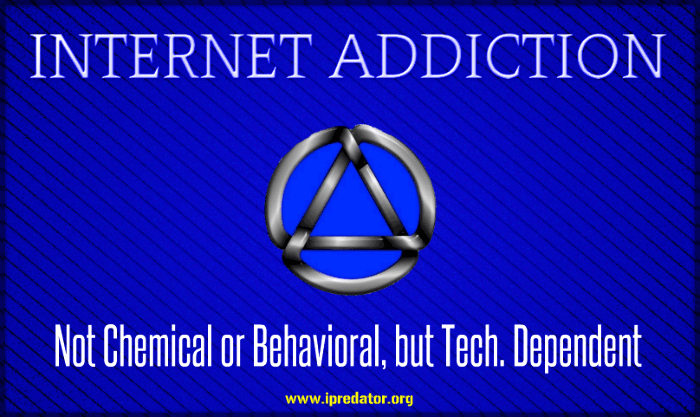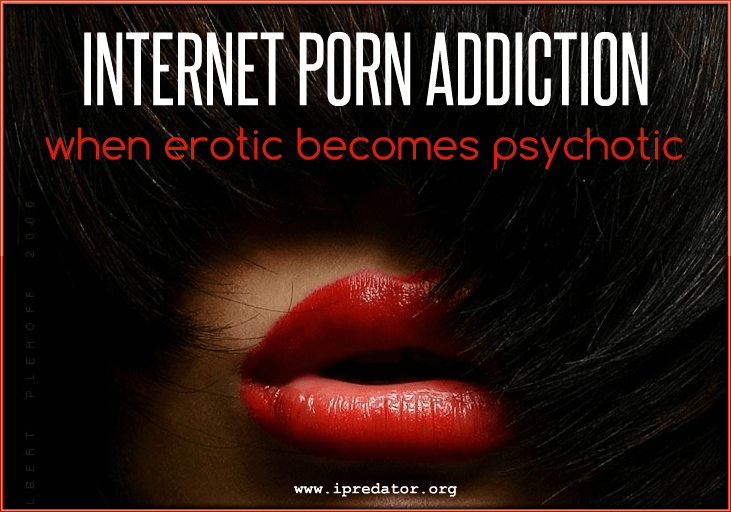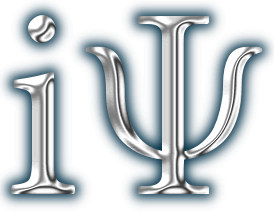Internet Addiction
What is Internet Use Disorder?
The Information Age is a period beginning in the last quarter of the 20th century and presently thriving in the second decade of the 21st century. The Information Age is a stage in societal and technological development like the Industrial Revolution (1750-1942). The Information Age represents the evolution, emergence, consumption of and reliance upon Information and Communications Technology (ICT). In a mere four decades, ICT and its importance to humanity have led many to surmise that the planet and its human inhabitants are amidst an Information Revolution.
Mobile digital technology, telecommunications, social media and the abstract concept and artificial universe of cyberspace are just a few examples of humanities newest frontiers. Both the benefits and detriments of society now centralize around the art & science of how to obtain, exchange and disseminate information.
The planet is experiencing a shift from traditional industry, born and bred during the Industrial Revolution, to an economy based on the creative and rapid manipulation of information. Just as the Industrial Revolution changed the lives of humanity, the Information Revolution is a societal shift rapidly changing humanity’s social, economic and psychological conditions of the times. The Information Revolution marks another major turning point in history, following the Industrial Revolution and changing every aspect of daily life unlike ever before.
Welcome to the Information Age!
Information and Communications Technology (ICT) is an umbrella term used to define any electronic or digital communication device or application used to obtain, exchange or disseminate information. ICT stresses the role of unified communications and the integration of telecommunications, which enable users to create, access, store, transmit and manipulate information. ICT consists of all forms of telecommunication, information technology, the internet, broadcast media, audio and video processing, transmission and network-based control and monitoring functions. ICT has rapidly become one of the basic building blocks of modern society and will become increasingly important as the Information Age matures.
Many industrialized nations now regard understanding ICT and mastering the basic skills and concepts of ICT as vital. For some, ICT is nothing more than a tool of convenience for conducting their responsibilities. For others, their social, scholastic, business and/or financial affairs disclosed in cyberspace and through ICT are crucial to their self-esteem, self-worth, success and perceptual world.
ICT has changed the way humanity interacts, exchanges and accesses information. Smartphones, mobile devices and social media are the latest in a succession of advancements growing at a feverish pace. It is often hard to fathom that the Internet, used by two billion plus people globally, only celebrated its 20th birthday in 2011. The negative aspects of the Information Age are the birth of what this author calls, iPredator, and the psychopathology of Internet Addiction (aka Internet Use Disorder.)
Although it is assumed all humanity, has residing deep in their psyche, the potential for behaving in harmful and malevolent ways they rarely or never activate, ICT and cyberspace offers a direct connection and psychological route to the dark side. Just as ICT and cyberspace are incredibly pro-social and beneficial to humanity, these same technological advancements can lead humanity to diabolical and sinister endeavors.
It is common knowledge, needing no clinical citations, to state that people who suffer from addiction, mood-mind altering substance disorders and non- mood-mind altering substance disorders, are at much higher rates of committing criminal, deviant and dysfunctional. The mention for further study of Internet Use Gaming Disorder in the 2013 Diagnostic and Statistical Manual of Mental Disorders, DSM-5, is the step towards recognizing the Information Age is a real period in human civilization. Although the DSM-5 has many opponents for several reasons, the discussions alone in 2013 on Internet Addiction validate how important Information and Communications Technology has become to citizens of the Information Age.
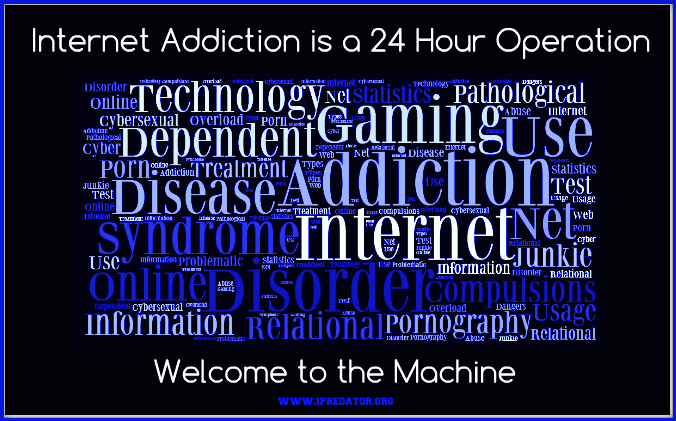
Internet Use Disorder
Internet Addiction and Internet Use Disorder are synonymous terms describing the compulsive dependency people experience using Information and Communications Technology. Humanity is thriving at the beginning of the period called the Information Age whereby digital devices and electronic communication channels are a priori. Internet addiction, information technology, cyberspace and virtuality are updated terms introduced to the English lexicon. Just as any new human experience, the Information Age and the growing dependency upon Information and Communications Technology is a proverbial “double edged sword.”
Contemporary Information Age society has now been introduced to Internet Addiction. In 2013, Internet Addiction and its psychopathology is a new mental illness for a new societal paradigm. In Mid-May 2013, this writer spent 3 days conducting research on Internet Use Disorder and the cornucopia of terms found were numerous. A list of these terms is as follows:
Internet Addiction – InfoAge Psychopathology
As the professional community and academics bicker over the terminology and tenets of Internet Addiction, the fact remains there are a growing number of children and adults who abuse and become dependent upon Information and Communications Technology. Despite the battle of terminology, etiology, existence and prevalence of Internet Addiction, this writer’s working definitions are as follows:
Internet Abuse
Internet Abuse: Internet Abuse (aka Internet Addiction & Internet Use Gaming Disorder) is an umbrella concept defining a child or adult’s compulsive and progressive abuse of the internet and electronic devices designed to obtain, exchange or disseminate information. Although the internet is the predominate arena in which Internet Abuse takes place, electronic devices and communications channels not internet enabled are also included in the definition.
Internet Abuse causes dysfunctional cognitive, affective, behavioral & perceptual intrapersonal consequences accompanied with employment, academic, familial, peer & intimate partner interpersonal consequences. On a continuum of severity, ranging from absent to mild, cessation of Internet and/or electronic device usage causes withdrawal symptomatology, psychological and/or physiological, combined with perceptual tolerance. Also, on a continuum of severity, Internet Abusive online users engage in criminal, deviant and/or deceptive online activities ranging from absent to severe.
The chronic and more debilitating condition, Internet Dependence, is more chronic, severe and self-destructive. Internet Abuse is segmented into six typologies as follows: Cyber Sex Fixated, Cyber Relationship Fixated, Internet Gaming & Online Commerce Fixated, Information Implosion Fixated, Dark Side Fixated and NOS (Not Otherwise Specified) Fixated. The NOS Fixated typology applies to internet abusing online users who share more than one typology, has a co-existing mental illness or medical condition causing psychiatric dysfunction.
Internet Dependence
Internet Dependence: Internet Dependence (aka Internet Addiction & Internet Use Gaming Disorder) is an umbrella concept defining a child or adult’s compulsive and progressive dependency upon the internet and electronic devices designed to obtain, exchange or disseminate information. Although the internet is the predominate arena in which Internet Dependence takes place, electronic devices and communications channels not internet enabled are also included in the definition. Internet Dependence causes dysfunctional cognitive, affective, behavioral & perceptual intrapersonal consequences accompanied with employment, academic, familial, peer & intimate partner interpersonal consequences.
On a continuum of severity, ranging from mild to severe, cessation of Internet and/or electronic device usage causes withdrawal symptomology, psychological and/or physiological, combined with perceptual tolerance. Also, on a continuum of severity, Internet Dependent online users engage in criminal, deviant and/or deceptive online activities ranging from mild to severe.
The mild and less debilitating condition, Internet Abuse, is not as chronic, severe or self-destructive. Internet Dependence is segmented into six typologies as follows: Cyber Sex Fixated, Cyber Relationship Fixated, Internet Gaming & Online Commerce Fixated, Information Implosion Fixated, Dark Side Fixated and NOS (Not Otherwise Specified) Fixated. The NOS Fixated typology applies to internet dependent online users who share more than one typology, has a co-existing mental illness or medical condition causing psychiatric dysfunction.

Internet Addiction Factors
1. Anonymity: One of the most powerful, if not the most powerful aspect of ICT is the inherent anonymity available to all ICT users. This privacy allows ICT users to obtain, exchange, and disseminate information along with being able to connect with others easily socially without their identity being revealed. Ranging from creating felonious online identities to pristine privacy comforted knowing their secrets cannot be connected to their identity if they choose, makes ICT the criminal, deviant & disturbed ICT user’s best friend.
2. Accessibility: ICT provides easy access to the information, materials & social contacts that meet whatever their obsessive-compulsive preoccupation may be. The online user is not bound by the restrictions of time, location & finances to locate and engage in his/her fixations.
3. Isolation: Depending on the ICT Abuser’s fixation, the ability to research, locate and engage others who share his/her fixation in an isolated environment allows them to engage in elevated risk online & ICT activities. Completely insulated from admonishment by friends, loved and co-workers, their false sense of total isolation increases the probability that all curiosity impulses are explored without concern of being identified, apprehended and punished.
4. Inexpensive: ICT is an extremely inexpensive tool in the ICT Abuser’s toolbox. Other than the cost of the ICT devices, utility bills and software, the ICT Abuser can access an untold number of websites, social contacts and organizations all specific to their chosen fixate. The added benefit to ICT being so inexpensive, red flags of large sums of money being drained is not an issue.
5. Fantasy: Common with all forms of addiction and psychopathology is the role of fantasy and dissociation. The internet world of the ICT Abuser is home to an entire universe, designed by them, and themed with their fixation. As the severity of addiction progresses, the ICT Abuser engages in longer periods of time when they are not using their ICT.
6. Disconnection: Synonymous with detachment, the ICT Abuser gradually disconnects from their real friends, family and associates. This process of disconnection can happen physically by spending more time in an isolated environment or happen psychologically. When psychological disconnection occurs, the ICT Abuser can be surrounded by loved ones, but their thoughts and complete focus are engaged in their fixations.
TYPES OF INTERNET ADDICTION
Cyber Sex Fixated
Comforted by the “veil of anonymity” available to all ICT users, cybersex addiction (aka Internet Sex Addiction) is the compulsive use of ICT driven by the obsessive need for sexual gratification. Whether viewing this psychopathology as a combination of sex addiction and internet addiction or a new disorder, cybersex addicted online users habitually access pornographic images and videos, seek out online contacts receptive to engage in sexually themed interactions and use ICT for sexual gratification. For Cyber Sex Fixated ICT users, they are enveloped by the addiction to internet pornography, adult chat rooms, adult fantasy role-play websites, sexually themed social networking sites, instant messaging, phone calling, tweeting and texting like-minded ICT contacts.
INTERNET ADDICTION TEST ITEMS
(correct responses should be no, false or disagree)
- 1. You or the subject spends increasing amounts of time focused on sexually themed information online.
- 2. You or the subject is involved in multiple online romantic or sexual affairs that is kept secret.
- 3. You or the subject has failed to cut back on habitually visiting online pornography websites and/or sexually themed adult dating sites.
- 4. Sexually themed online activities have interfered with you or the subject’s work, school or household responsibilities.
- 5. Sexually themed online activities have interfered with you or the subject’s intimate partnerships.
- 6. You or the subject habitually collects internet pornographic images and videos.
- 7. You or the subject fantasizes about online sexual acts or experiences, which would be illegal if carried out or implemented.
- 8. Has your social or family interactive time decreased due to online fantasy involvement?
- 9. You or the subject is secretive and deceptive about the amount of time spent online engaged in sexually themed activities.
- 10. You or the subject becomes agitated, irritable or anxious when unable to access online sexually themed information.
Cyber Relationship Fixated
Heavily influenced by wanting to engage in a close social relationship, Cyber Relationship Addiction is fueled by the compulsive need and fixation upon being part of, accepted and recognized by another person. For the Cyber Relationship fixated ICT user, online dating sites, chat rooms and various social networking sites become their habitual repertoire for all ICT usage.
Common, but not necessary, for the Cyber Relationship Fixated ICT user frequenting websites and forums that are sexually themed. Whereas the Cyber Sex Fixated ICT user is fixated upon sexual gratification, the Cyber Relationship Fixated ICT user is obsessed with the acquisition of sexual and non-sexual intimate partnerships. For Cyber Relationship Fixated ICT users, they are enveloped by the addiction to social networking, chat rooms, instant messaging, phone calling, tweeting and texting.
INTERNET ADDICTION TEST ITEMS
(correct responses should be no, false or disagree)
- 1. You or the subject habitually engages with romantic partners met online, while being involved in a marital or other primary relationship.
- 2. You or the subject increasingly feels lonesome when not able to access the internet to contact online relationships.
- 3. You or the subject has become habitually focused upon online involvement to engage with partners, family or friends.
- 4. You or the subject spends significant amounts of time in chat rooms and other online venues driven by the fantasy of locating an intimate partner.
- 5. You or the subject is increasingly preoccupied with using the internet to find online intimate or sexual partners.
- 6. You or the subject is becoming more enveloped by thoughts of meeting a special person online.
- 7. You or the subject views online relationships as more rewarding than offline relationships.
- 8. You or the subject spends all available online time engaged in social networking, chat rooms and/or messaging new or hopeful online contacts.
- 9. You or the subject increasingly engages in fantasy about an abstract or newly introduced online contact
- 10. You or the subject habitually believes a new online contact’s attributes, geographic location or stories despite having information that may suggest otherwise.
Gaming & Online Commerce Fixated
The ICT user who is Gaming & Online Commerce Fixated, spends most of their ICT time engaged in browsing, purchasing, gaming and betting at online shopping websites, online gaming websites, virtual casinos, auction sites and interactive gaming sites. Of the many sub types of Internet Addiction, the Gaming & Online Commerce Fixated typology is usually the costliest. The thrill and excitement of competition educated consumerism and gambling are primary motivating factors. Compulsive online gaming, stock trading, virtual casinos and online auction sites are most detrimental to adults, while online gaming sites are the pediatric proverbial “opium” for children.
INTERNET ADDICTION TEST ITEMS
(correct responses should be no, false or disagree)
- 1. You or the subject has recently been unable to pay bills due to money loss from online gambling.
- 2. You or the subject has recently lost a significant amount of funds from online stock trading that was previously allocated to other fiscal responsibilities.
- 3. You or the subject has become compulsive spending large periods at online auction sites bidding on non-essential products.
- 4. You or the subject has been confronted by a loved about obsessively playing off-line computer games.
- resulting in financial and job-related problems.
- 5. You or the subject has been increasingly isolating from friends and family to play online games or online gambling.
- 6. You or the subject has been confronted by friends or family spending lengthy periods participating in online fantasy games.
- 7. You or the subject are noticeably playing online games for increasing amounts of time
- 8. You or the subject habitually thinks about gaming, gambling or online shopping during other offline activities.
- 9. You or the subject habitually fantasizes about gaming, gambling or online shopping to escape from life problems or feelings of anxiety and depression.
- 10. You or the subject habitually lies to friends and family to conceal gaming, gambling or online shopping.
Information Implosion Fixated
Synonymous terms to the Information Implosion Fixated ICT user are “information addicts,” “dataholics” or an ICT user suffering from “infobesity.” Given the infinite amount of information and data available to all ICT users on the internet, the Information Implosion Fixated ICT user is fixated upon the unending amount of available information he/she can obtain, exchange and disseminates. Obsessed with information and data, this typology of Internet Addiction spends inordinate amounts of time engaged in compulsive Web surfing and database searches. For them, the amount of information is the addiction and not the themes of the information they acquire.
INTERNET ADDICTION TEST ITEMS
(correct responses should be no, false or disagree)
- 1. You or the subject habitually thinks about wanting to be online to explore different subjects.
- 2. You or the subject habitually searches online looking for information and topics that are not of genuine interest.
- 3. You or the subject receives a flood of online information daily and feels pressured to open, answer or scan over all material.
- 4. You or the subject become overwhelmed by the information available when completing work tasks and feel pressured to review all online sources.
- 5. You or the subject habitually attempt to check all incoming emails fearing that deleting them before reading will lead to negative consequences.
- 6. You or the subject habitually takes extended periods to return to suspended work and/or tasks than expected.
- 7. You or the subject experiences intermittent memory loss and/or difficulty concentrating on work, school or home responsibilities due to habitual online usage.
- 8. You or the subject prefers spending time online rather than with offline contacts engaging in offline activities.
- 9. You or the subject experiences regular time distortion events due to online activities.
- 10. You or the subject feels immediately compelled to access the internet when an unknown answer to a personal or social question is posed for speculation.
Dark Side Fixated
Rarely discussed in the Internet Addiction typology research is the Dark Side Fixated ICT user. The Dark Side Fixated ICT user is obsessed with all things anti-social, racial, bigoted, violent, criminal, deviant and bizarre. This typology is one the following types: Information Accessibility Fixated, ICT Gaming & E-Commerce Fixated, Cyber Relationship Fixated or Cyber Sex Fixated, but the theme and content that colors their fixation is perceptually distorted.
Serial Murder websites, Sado-Masochism adult dating sites, violence/death/murder and obscene material, fascinated by dark elements of religious dogmas, attempts to socially connect with like-minded ICT users and seeks out like minded ICT users to taunt, disparage and scare others. Dark Side Fixated is similar to Doomscrolling..
INTERNET ADDICTION TEST ITEMS
(correct responses should be no, false or disagree)
- 1. You or the subject spends most of your time online searching for information themed with violence, obscenity or macabre.
- 2. You or the subject habitually spend time searching for bizarre or grotesque information online to share with others.
- 3. You or the subject finds little interest in benevolent and positive information online.
- 4. You or the subject fantasizes when online and offline about engaging in violent, deviant and/or bizarre activities.
- 5. You or the subject spends substantial amounts of time designing and creating online personas, usernames and profiles that are evil, death, darkness, deviant or violence themed.
- 6. You or the subject spends increasing periods engaged in fantasizing about meeting an intimate online contact that shares the same dark interests.
- 7. You or the subject requires dark themed content, online conversations and multimedia to feel gratification.
- 8. You or the subject increasingly attempts to dress, behave and mimic in a manner believed to be in line with created usernames, profiles and online identities.
- 9. You or the subject is increasingly isolating from friends and family to spend more time online seeking out others who share dark themes.
- 10. You or the subject increasingly engages in cyber harassment or cyber stalking activities attempting to control online users and inspire fear.
Internet Addiction Signs & Symptoms
(Symptoms must include a progression of severity and not due to academic and/or employment responsibilities.)
AFFECTIVE
Personal Emotions
Example: I felt or was feeling.
- Feel ICT usage is required to feel “normal” or satisfied.
- Negative emotional states including guilt, shame, fear, sadness or anger.
- Thinking about past ICT activity alternating about anticipating future ICT activity.
- Feeling restless, moody, depressed, frustrated or irritable when attempting to curtail ICT usage.
- Feelings of guilt, shame, anxiety or depression because of ICT usage.
- Feelings of frustration, anger, tension & depression when ICT is inaccessible.
- Feeling a need to engage in ICT usage at intervals that are more frequent.
- Feeling a sense of loss of control related to habitual ICT usage.
- Feeling “cravings” when ICT is not accessible.
- Feeling a need to engage in ICT usage at intervals that are more frequent.
- Feeling a sense of loss of control related to habitual ICT usage.
- Feeling “cravings” when ICT is not accessible.
BEHAVIORAL
Personal Actions
Example: I acted, said, tried, etc.
- Increasing neglect of basic hygiene.
- More time is spent using ICT than planned.
- Engaging in high-risk ICT activities.
- Lower productivity and performance at school or work.
- Repeatedly using ICT as a replacement for relationships.
- An increase in isolating from friends and loved ones to spend time using ICT.
- Spending more time socializing using ICT than offline.
- Difficulty completing tasks at work, school or at home due to ICT usage.
- Failed attempts to control or reduce ICT usage.
- Deception & Dishonesty employed regarding ICT usage.
- Physical changes such as loss of sleep, weight loss or gain, backaches or headaches.
- Recent loss of close relationship, job, academic or career opportunity due to ICT usage.
- Pattern of ICT tolerance by needing better ICT, more ICT software or more hours of ICT use.
- Actively hiding Internet Addiction behaviors from friends and loved ones.
- Pattern of relapse defined as being unable to fulfill ICT control goals.
- Habitually seeking new relationships with fellow ICT users.
- A prior history of abuse with ICT, mood/mind altering chemicals or behavioral addictions.
- A past or present history of mood disorders or other mental illness.
- Habitually checking emails or social media profiles daily.
- Persistently attempting to engage peers in controlling ICT usage.
- Friends or family complain about ICT usage and/or themes of ICT content investigated.
- Becomes easily agitated when family or friends interrupt ICT usage.
COGNITIVE
Personal Thoughts
Example: I thought or was thinking.
- Frequent thoughts related to future ICT usage.
- Think more ICT usage time is the answer when feeling negative or frustrated.
- Difficulty concentrating, failing memory or loss of time awareness.
- Obsessive thoughts about Internet addiction, but not seeking help.
- Minimizing thoughts of negative consequences caused by Internet Addiction.
- Using thoughts of ICT usage to block out disturbing thoughts about life.
PERCEPTUAL
Personal Interpretation
Example: I assumed, believed, denied, minimized, etc.
- Denial of Internet Addiction.
- Loss of interest in hobbies and other activities.
- Loss of interest in friends and significant others.
- Becoming defensive when confronted by others about ICT usage.
- ICT usage produces a sense of euphoria, anticipation or excitement.
- Experiencing an internal desire to increase ICT usage time.
- Decreased sense of achievement, accomplishments or meaningful purpose from ICT usage.
- View ICT usage as therapeutic to alleviate feelings of helplessness, guilt, anxiety and depression.
- Believe ICT usage can be effectively used to control moods. (positive and negative)
- Psychological or physiological withdrawal sensations when ICT is inaccessible.
- Prefers the excitement attributed to ICT as opposed to intimacy of a partner.
Free Internet Addiction Checklist
Internet Addiction Risk Checklist (IARC): The Internet Addiction Risk Checklist (IARC) is a 100-item risk assessment designed to investigate if an Information and Communications Technology (ICT) user is engaging in pathological use of the internet and ICT. The checklist statements have been categorized into cognitive, affective, behavioral and perceptual sections all themed surrounding the compulsive dependent use of digital devices. The IARC can be taken as a self-assessment and when assessing others. Although the IARC is a general assessment for pathological ICT usage, supplement items have been added to focus on the areas of Cyber Sex, Cyber Relationship, Gaming & Online Commerce, Information Accessibility & Dark Side ICT usage.
Michael Nuccitelli, Psy.D.
Michael Nuccitelli, Psy.D. is a NYS licensed psychologist, cyberpsychology researcher and online safety educator. In 2009, Dr. Nuccitelli finalized his dark side of cyberspace concept called iPredator. Since 2010, he has advised those seeking information about cyberbullying, cyberstalking, cybercriminal minds, internet addiction and his Dark Psychology concept. By day Dr. Nuccitelli is a practicing psychologist, clinical supervisor and owner of MN Psychological Services, PLLC. After work and on the weekends, he volunteers helping online users who have been cyber-attacked. Dr. Nuccitelli’s is always available to interested parties and the media at no cost. This website and everything created by Dr. Nuccitelli is educational, free and public domain.
